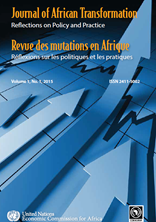Journal of African Transformation

A diagnostic study of the African economic structure reveals that Africa’s growth acceleration in recent years has not been associated with economic structural transformation. In general, the agriculture sector is still a major employer of the majority of the labour force albeit representing a small share of its value-added in total GDP. The service sector is the largest sector in GDP and in total employment for most African countries. This leaves only a few countries, in which the industry sector plays the role as the largest sector in output, but not in employment. Specifically, productivity in the agriculture sector is still relatively low. Among the four stages used to categorise the state of development in agriculture, i.e. the ‘beginning’, ‘agricultural surplus’, ‘integration’, and ‘industrialisation’, most African countries are at the beginning phase and only a few in the agricultural surplus phase. In the industry sector, along the inverted U-shape curve representing the two phases in the process of industrialization, the ‘industrialisation’ and ‘deindustrialization’ phases, the majority of African countries are in the stage of being ‘not industrialised’ with the exception of only two countries which are in the industrialised but not the deindustrialised stage. The service sector is dominated by traditional rather than modern services. Between the ‘two waves’ of the service sector, most countries are still in the first (‘traditional’) wave of the development of the service sector and have not started the second (‘modern’) wave. African countries have lacked industrialisation up until the most recent decade. The new ICT era, and globalization with foreign direct investment and global supply and value chains, have made the industrialisation process faster and easier than before and brought the opportunity for African countries to quickly catch up with the latest technology, and modern management knowledge and skills. Governments have more important roles to play in identifying proper and relevant industrial policies.